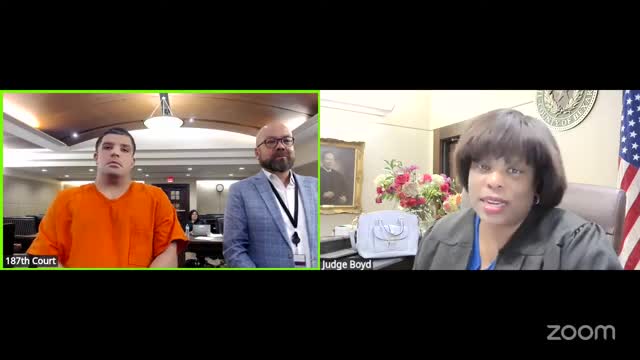Court sentences Leo Cantu to 210 days jail and 5 years prison for felony charges
March 20, 2025 | Judge Stephanie Boyd 187th District, District Court Judges, Judicial, Texas
This article was created by AI summarizing key points discussed. AI makes mistakes, so for full details and context, please refer to the video of the full meeting. Please report any errors so we can fix them. Report an error »

The afternoon docket of the 187th District Court in Texas on March 20, 2025, focused on several significant cases, including plea agreements and sentencing for felony convictions. Judge Stephanie Boyd presided over the proceedings, addressing multiple defendants and their respective legal situations.
One notable case involved a defendant who entered a plea bargain agreement related to a felony conviction. The judge emphasized that due to the nature of the plea, the defendant waived their right to appeal. The court reiterated that as a result of the felony conviction, the defendant is prohibited from owning or possessing any weapons or ammunition, particularly due to an affirmative finding of family violence.
The court also reviewed the defendant's compliance with probation requirements, noting some violations, including negative drug tests and issues with completing mandated programs. The judge expressed concern over the defendant's involvement in a recent incident where they were identified as the aggressor, despite their claims of attempting to de-escalate the situation. The court ultimately sentenced the defendant to two years in prison, following the plea agreement, and mandated no contact with the complainant.
In another case, the court addressed the situation of Leo Anthony Cantu, who faced charges of evading arrest and assault on a peace officer. The judge confirmed that Cantu had received and understood the charges against him and had waived his right to a jury trial. The court accepted his plea of no contest and sentenced him to 210 days in jail for the lesser charge and five years in prison for the assault charge, with both sentences running concurrently.
Throughout the proceedings, Judge Boyd ensured that each defendant understood their rights and the implications of their pleas. The court's focus on adherence to plea agreements and the consequences of felony convictions highlighted the serious nature of the offenses being addressed. The session concluded with the judge reminding defendants of the importance of compliance with legal requirements to avoid future legal issues.
One notable case involved a defendant who entered a plea bargain agreement related to a felony conviction. The judge emphasized that due to the nature of the plea, the defendant waived their right to appeal. The court reiterated that as a result of the felony conviction, the defendant is prohibited from owning or possessing any weapons or ammunition, particularly due to an affirmative finding of family violence.
The court also reviewed the defendant's compliance with probation requirements, noting some violations, including negative drug tests and issues with completing mandated programs. The judge expressed concern over the defendant's involvement in a recent incident where they were identified as the aggressor, despite their claims of attempting to de-escalate the situation. The court ultimately sentenced the defendant to two years in prison, following the plea agreement, and mandated no contact with the complainant.
In another case, the court addressed the situation of Leo Anthony Cantu, who faced charges of evading arrest and assault on a peace officer. The judge confirmed that Cantu had received and understood the charges against him and had waived his right to a jury trial. The court accepted his plea of no contest and sentenced him to 210 days in jail for the lesser charge and five years in prison for the assault charge, with both sentences running concurrently.
Throughout the proceedings, Judge Boyd ensured that each defendant understood their rights and the implications of their pleas. The court's focus on adherence to plea agreements and the consequences of felony convictions highlighted the serious nature of the offenses being addressed. The session concluded with the judge reminding defendants of the importance of compliance with legal requirements to avoid future legal issues.
View full meeting
This article is based on a recent meeting—watch the full video and explore the complete transcript for deeper insights into the discussion.
View full meeting
